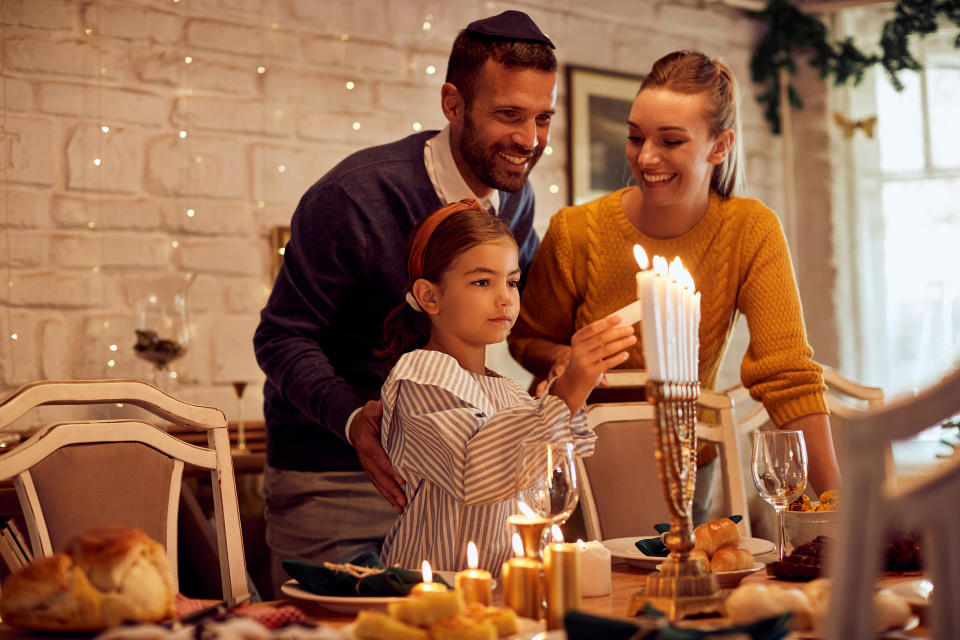When is Hanukkah in 2022? What to know before the Festival of Lights
Break out your menorah because it's almost time for those eight special nights.
Every December, Jewish people around the world recognize the holiday of Hanukkah, also known as the Festival of Lights. And while it's a time to come together to exchange presents, spend quality time with loved ones and devour traditional Jewish foods (latkes, brisket and jelly doughnuts, oh my!), the holiday holds a deeper significance.
“Hanukkah commemorates how the Maccabees, a small ragtag group of faith-adhering soldiers, defeated the large and well-equipped army of Syrian Greeks,” Rabbi Pinchas Taylor, founder of The Ark, a Torah study and coaching program, tells TODAY.com. “Good always triumphs over evil, and a little bit of light dispels much darkness,” he adds, offering a poignant takeaway that’s all the more resonant in recent years.
No matter where how much you think you know about Hanukkah, keep reading to learn more about the history and meaning behind the winter holiday. Plus, find out when you should plan to celebrate in 2022. (Yes, we’ll even explain why the dates shift every year, so you can have some fun facts to share at your upcoming festivities.)
When is Hanukkah in 2022?
Hanukkah in 2022 will commence the evening of Sunday, Dec. 18, and end on the evening of Monday, Dec. 26. Now that you know the dates well in advance, take some time to perfect your latke (potato pancakes) or brisket recipes.
Are the dates the same every year?
The Hanukkah dates do, in fact, change every year.
“The dates shift every year in relation to the solar calendar used by the Christian and secular world because the Jewish calendar is both a solar and lunar calendar,” Rabbi Douglas Sagal, BA, MA, STM, DD, from Congregation B’Nai Israel, tells TODAY.com. The dates change to "address the discrepancy between the two calendars," but the Hebrew date is always the 25th of the month of Kislev.
The Jewish calendar is based on the lunar cycle, which Taylor adds "has 354 days, as opposed to the Gregorian calendar, which is based on the solar year of 365 days."
What is the history of Hanukkah?
We touched on the Maccabees victory earlier, but here’s a deeper look.
"Hanukkah commemorates the victory of the Jewish people in the Land of Israel over their Syrian overlords in a battle for religious liberty that took place from approximately 167 B.C. to 160 B.C.” Sagal says. “The rebellion began when the Syrian rulers, led by the tyrant King Antiochus Epiphanes, severely restricted the rights of the Jewish people to practice their religion freely. Led by a priestly family named Maccabee, a relatively small band of Jews conducted a guerilla war that eventually grew to a full-grown rebellion.”
Hanukkah itself not only marks the rebellion and the restoration of religious autonomy, but a very specific event: the liberation of the sacred Temple in Jerusalem on the 25th of the Hebrew month of Kislev and the restoration of religious practices at the Temple. This is why Hanukkah always begins on the 25th of the month of Kislev.

Why does Hanukkah last eight days and nights?
The length of Hanukkah is a miracle — quite literally. According to tradition, the holiday lasts eight days because, as Sagal puts it, "the Maccabees only found enough sacred oil to kindle the Menorah lamp for one day, but it miraculously lasted for eight."
What's more, Taylor points out that seven often symbolizes the natural world — seven continents, seven colors of the rainbow, seven notes on the music scale and so on. Eight, on the other hand, is the symbol for the supernatural. "The lights of the menorah lasted eight days, symbolizing that there was supernatural intervention, and that those eight days were eternally embedded with holiness,” Taylor says.
Today, lighting the eight candles over eight days "symbolizes the necessity of gradual spiritual growth.” For these reasons and a connection to a tradition, millions of Jewish people around the globe celebrate Hanukkah every year — and look forward to lighting candles, honoring history and making cherished new memories with loved ones.
This article was originally published on TODAY.com

